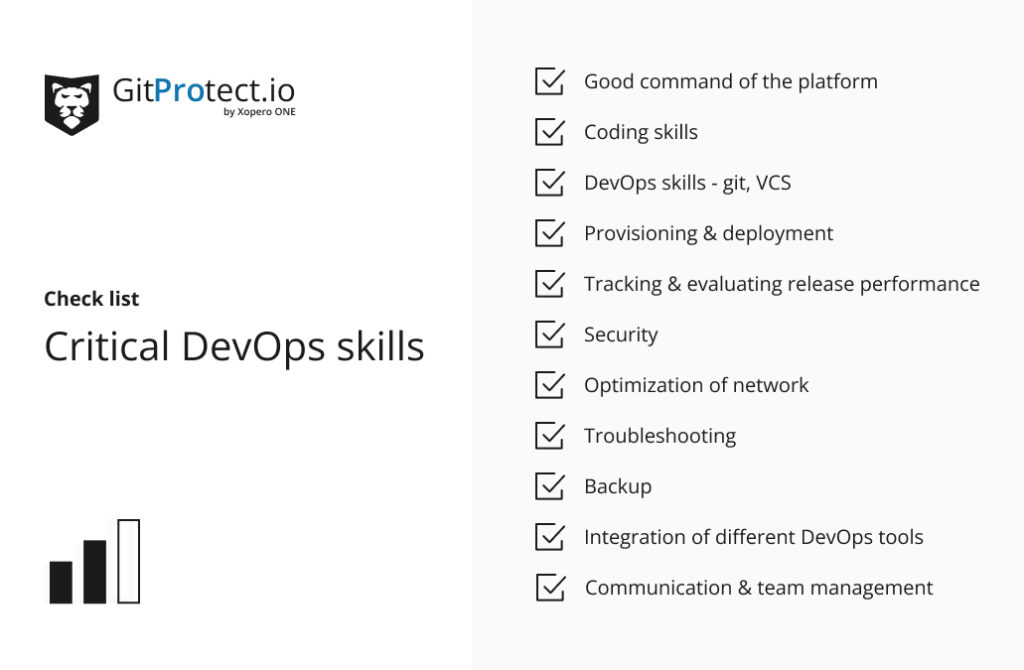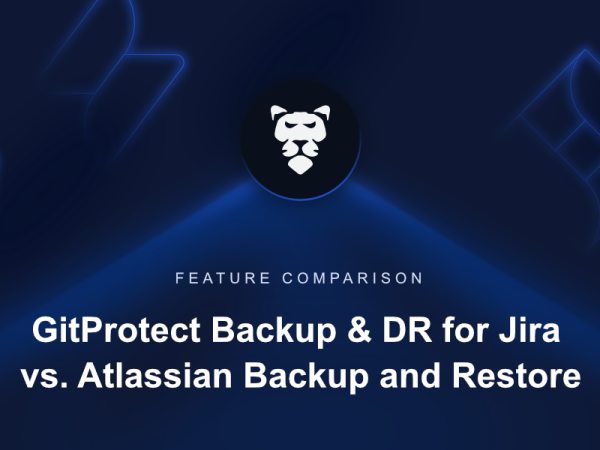
Harnessing DevOps Potential: Why Backup Is a Missing Piece
We often hear about the importance of developers and the role they play in the success of a business. After all, they are those craftsmen who create the software and apps that make businesses run smoothly.
However, there is one key element of development that is still overlooked – backup. Why? DevOps is constantly focused on delivering the best user experience and making sure the apps they build are bug-free. Yet what if something goes wrong one day or another? Let’s move on step-by-step…
The role of DevOps engineer today
Currently, DevOps engineers have to cover a diverse set of responsibilities and skills. Working on the intersection of Development and Operations, they aim to boost the software development process and keep up with high-quality standards. Depending on the size of an organization a developer may need to have solid grounds in development, operations, infrastructure, and sometimes even project management and business.
Moreover, developers should always stay updated with the latest trends, technologies, and DevOps principles to make their work more efficient and productive… Let’s not forget, the quality of the product is at stake…
Writing, reviewing, and validating the source code, building the DevOps toolchain, managing CI/CD tools, which enlarge from time to time, analysis and automation, troubleshooting, and incident management, and creating security measures using risk management techniques and vulnerability assessment are just a small part of what DevOps may be responsible for.
The main focus of developers
With the modern world relying on technology more and more, developers can feel the heavier burden of responsibilities on their shoulders. Of course, the main idea is to create software that is user-friendly and effective. So, what bundle of firm DevOps skills do developers need to have?

Good understanding of the platform
Most IT systems are built on the concept of a stack, which is the assemblage of widely used operating systems, services, and related toolkits for creating, implementing, and maintaining apps. That’s why DevOps must be experienced in the stack the organization uses or is about to employ. There are three main stacks that DevOps should know well. They are Cloud framework, Linux server distributions, and Microsoft Windows Server.
Scripting and programing languages
When we speak about DevOps practices we assume that code gets into production fast through development. Thus, the main task of the DevOps engineer is to comprehend the source code, write scripts, and handle integrations. For example, to get the code version to communicate with the MySQL database for operations-side deployments.
To perform their daily routine tasks effectively DevOps engineers should be proficient in PHP, Python, Perl, Ruby, Java, C++, and some other programming languages… which is an extensive knowledge base. Moreover, it’s important to have a clear understanding of build and CI/CD tools, like Jenkins, Apache Maven, and other tools to optimize DevOps workflow.
Speed and agility – Understanding of appropriate tools
DevOps is all about speed and agility. And its success often depends on the toolset DevOps rely on during each stage of implementation. Let’s not forget – nothing stands still, even the code. Developers should always adjust to the needs and requirements of their company’s customers in improving their products and developing the latest updates of the apps.
For that reason, first, they have to understand what is Git and its benefits among other version controls, that are critical for software development these days. Moreover, DevOps engineers should have a clear view of the Git hosting services, including GitHub, GitLab, Bitbucket, etc., and their differences to be able to opt for the most suitable one that meets the organization’s needs.
Read more about the differences between Git platforms in our blog posts:
📌 Git Battles Part 1: GitHub vs. Bitbucket – What to choose for your development team?
📌 Git Battles Part 2: GitHub vs. GitLab
📌 Git Battles Part 3: GitLab vs. Bitbucket
Hovewer, it’s not everything… the sheer amount of tools that DevOps has to deal with is difficult to enumerate. Apart from Git and Git hosting services, DevOps engineers should be aware of working with:
- Continuous Integration servers
- Deployment automation
- Infrastructure orchestration
- Configuration management
- Containers
- Testing and cloud quality tools
- Network protocols
- Monitoring and analytic tools
Automation expertise
Automation is the heart of the DevOps process. That’s why DevOps engineers should usually have a good command of it to automate their tasks in the entire DevOps pipeline. Continuous Integration and Continuous deployment, security, and configuration management – all those processes can be automated for DevOps efficiency and streamlining of their workflow.
Security skills
Enterprise security is becoming more and more dependent on DevOps engineers as the risk rates are largely in line with the development pace DevOps enables. Writing secure code considering security concerns, testing for vulnerabilities in the CI/CD pipeline, troubleshooting, shifting security left, data encryption, and maintaining intrusion prevention systems and antimalware software may also rely on the DevOps team’s shoulders. However, what’s missing?
Is backup a missing piece?
As we have already started talking about security, it’s critical to mention that DevOps practices are involving security methodologies more and more, giving rise to DevSecOps practices. With it, organizations can improve source code protection, quality, visibility, monitoring, and compliance.
Unfortunately, focusing on production DevOps can often forget about backup. Well, they won’t disregard backup at all, they can perform manual copies of their data or rely on the Git hosting provider they push their code to. Though, it’s not enough. The backup script, manual copies of the source code, and snapshots can’t be considered a reliable backup plan that can guarantee data recoverability in any event of failure. It’s a myth that every backup always comes with Disaster Recovery.
Moreover, developers should always keep in mind that all SaaS providers follow the Shared Responsibility model, and if something happens to their data – accidental data deletion, lost data due to an outage, or a ransomware attack, – that’s them who will need to deal with the disaster.
We have already debunked a number of DevSecOps Myths regarding data protection. Take a look whether you still believe in them:
❌ I use GitHub/GitLab/Bitbucket so I don’t need backup
❌ GitHub/Atlassian/GitLab handles backup and restore
❌ Nothin fails in the cloud/SaaS
That’s why skills in backup and data protection are an important aspect for DevOps engineers. Moreover, they shouldn’t consider backup as a separate process, it should be regarded as an essential component of their DevOps workflow.
What DevOps should know about backups?
To make sure that their work is secured, DevOps engineers need to understand how to build a secure backup plan. As we have already mentioned, a copy isn’t enough…
To ensure the security and protection of the source code, the most critical data, it’s vital to build reliable data protection that covers:
- automatic scheduled backups that allow DevOps to save their time without interrupting for making manual backup copies;
- full data coverage, which means that the backup copy should include not only repositories but also all the related metadata.
- option to keep data in a few storage instances, which will help to meet the 3-2-1 backup rule, assuming you have 3 copies in 2 different locations with one of them off-site.
- unlimited retention, which allows to restore data from any point in time;
- Disaster Recovery which guarantees that developers can restore their data granularly or in full volume from any point in time to their company’s GitHub, GitLab, Atlassian account, or a new one, to their local device, or cross-overly to another Git hosting service, e.g. from Bitbucket to GitHub;
- grantee of ransomware protection, which is a bundle of security features that ensures that backups are encrypted in-flight and at rest in WARM-compliant storage;
- monitoring capabilities, which will help to track backup performance.
Conclusion
With businesses aimed at becoming more lean and agile, the skills DevOps may need vary from company to company. Organizations are becoming more and more interested in finding the methods that will help them streamline their processes while ensuring security. That’s why good command of DevOps tools – build and CI/CD, continuous monitoring and DevSecOps, automation and collaboration tools, – is critically important. As it helps to boost productivity and the efficiency of workflow.
[FREE TRIAL] Ensure compliant DevOps backup and recovery with a 14-day trial 🚀
[LIVE DEMO] Let’s discuss your needs and see a live product tour






